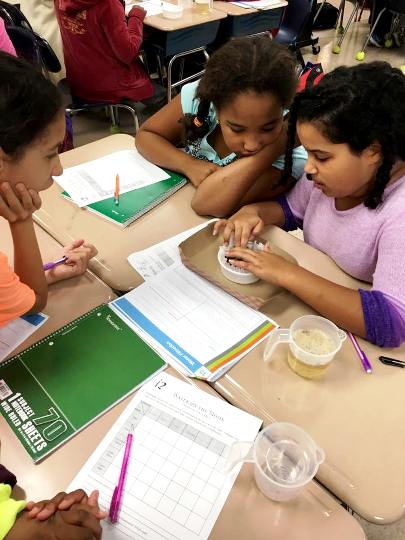
Students at the Roosevelt School working on their lunar colonies during Boston STEM week.
At the kickoff event for Boston STEM Week Superintendent Tommy Chang told students: “STEM occupations are growing at a rate stronger than non-STEM jobs. STEM-related jobs also pay much higher. Science, technology, engineering, and mathematics workers complete such a critical role . . . and we want to help you get ready for those jobs and those careers.”
The data backs up Dr. Chang’s message to students. Locally, jobs in the STEM fields are growing at a rate almost twice that of non-STEM careers. In Massachusetts, there are 36,000 fewer degrees in STEM fields being granted by higher education institutions than employers will need by the end of this decade.
While Boston Public Schools (BPS) has the highest math proficiency rates of all urban districts in America, we are challenged by the fact that only a third of BPS students are proficient in math in the eighth grade. While proficiency rates are better in the earlier grades, we see that command of this core subject area declines as students move through the middle school years. Studies also show that proficiency in math in the middle grades leads to the completion of more rigorous math courses in high school which in turn is highly correlated with college success and completion. To truly prepare students, we need to tackle this core educational issue together.

Boston STEM Week has been engaging for students; I can tell you that as a parent of a BPS 6th grader that has come home each day this week brimming with enthusiasm about the lunar colony he is creating in his classroom. It is equally exciting to see how this effort has been engaging a broader audience as it puts a spotlight on the issue of STEM education not only for schools but also for the wider public.
This spotlight is vital and we must continue the collaborative efforts to keep a focus on STEM far beyond this important week-long effort. At EdVestors, we are focused on elevating the “M” in STEM through our Zeroing in on Math Initiative. The hands-on activities that STEM Week has provided are a critical spark for students. To ensure students are truly prepared for the STEM careers in our economy, they must also build the foundation of mathematical knowledge necessary for success in college, in their careers, and as citizens. This is the message I have been giving my son all week while he completes his math homework, and it’s the message we must send to all of our students in Boston.
If we are going to close achievement gaps and prepare all our students for the option to pursue STEM careers, we must zero in on math. "Our country's future engineers, scientists, and entrepreneurs are sitting right here in our Boston Public Schools' classrooms," said Boston Mayor Martin J. Walsh while celebrating STEM Week. I couldn’t agree more.




